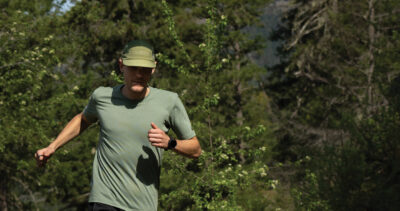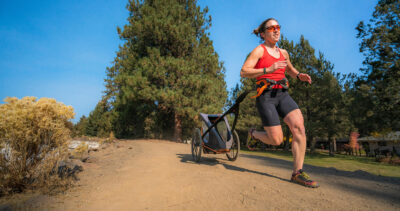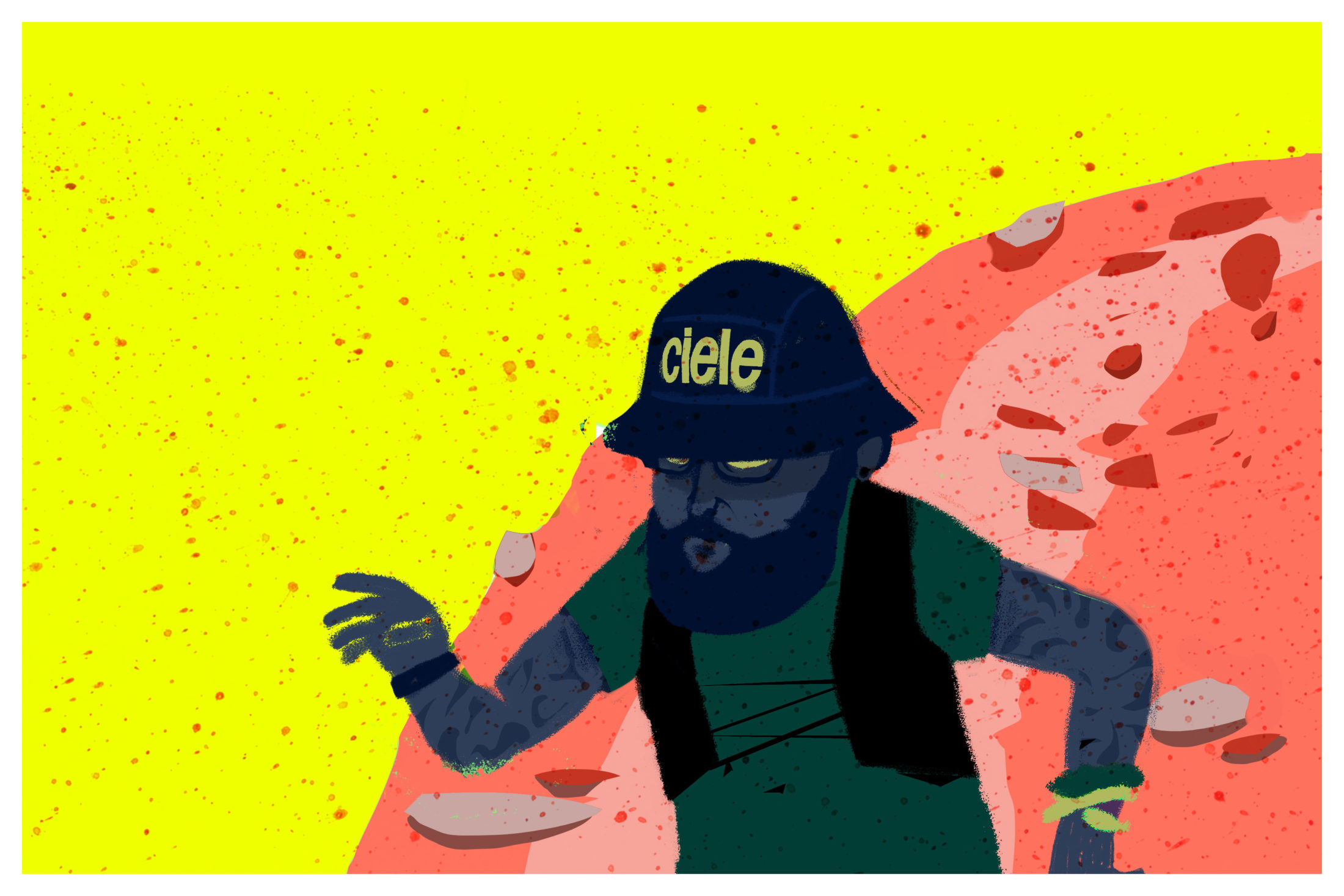
the slow protest
the slow protest
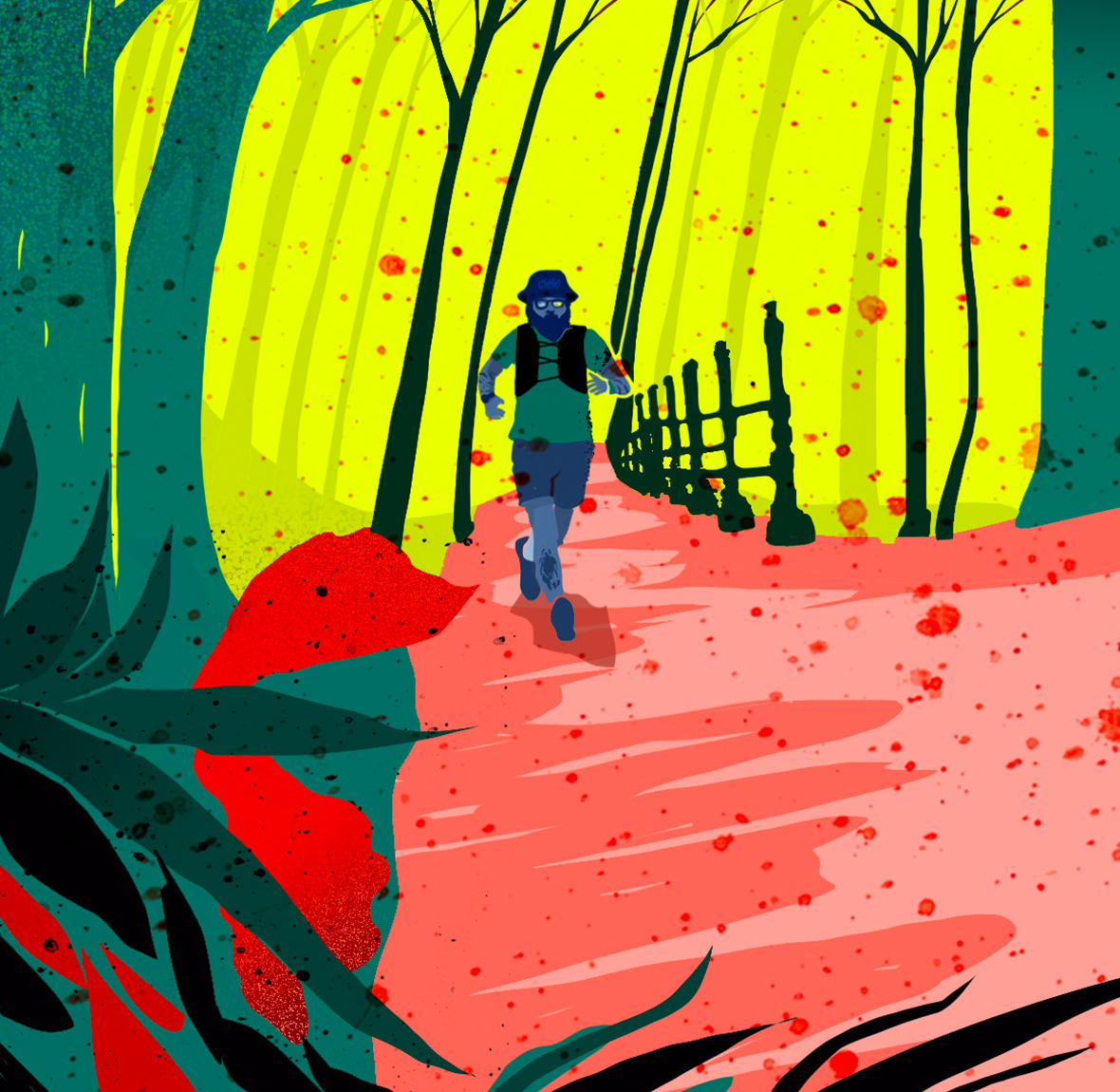
words x
paul lott
illustrations x
max coubes
Running slowly seems like such a contradiction, even a bit counterintuitive. But for some, it’s neither. It’s a choice. There’s always that one person who thinks they’re so clever when they ask, “isn’t running slow just fast walking?” Well, yes and no. It’s 2021, and defining just about anything these days quickly becomes a personal matter, especially when it relates to our identities. Some people just want to have fun when they run and others won’t rest until they qualify for a world major. No matter how fast or slow you run, in one way or another, your approach eventually becomes a reflection of who you are when the shoes come off. Maybe you care about qualifying for Boston or bagging an FKT, or maybe you don’t.
in the case of ultra-athlete and trail pirate jordan shrier, he does not give a damn what you think about his pace. he’s gonna run slow. really slow.
“I’m not a fucking athlete,” Jordan huffed in between sips of pickle juice and craft beer. “I don’t even look like one.” He could hardly get his words out from all the pizza stuffed in his mouth. Melted cheese clung to his beard like a spider’s web you cop to the face when you’re the first one through the trail. We had just finished our 100th kilometer of the week with over 4 000 meters in elevation. “How are you not an athlete, Jordan,” I pressed. He laughed, sending pizza particles ricocheting off my face. Suddenly, it all made sense. Jordan is about as far away from the stereotypical athlete as one could possibly be. His response to not fitting in mold? “Je m’en calisse.”
A few years ago, Jordan was living and working in Tel Aviv as a chef. The long hours spent in the kitchen were only adding to his misery. “I was really fat and unhappy,” he stated flatly. “I messed up my back from standing around all day and it dawned on me that I needed to get healthy or just succumb to being a sad, fat idiot for the rest of my life.” The doctors he consulted about his health just wanted to pump him full of drugs. “I didn’t want to go that route because I know it’s bullshit. I knew I had to change on my own, so I did,” he said proudly.
Jordan went vegetarian, started exercising daily, and in less than a year, lost over one hundred pounds. He had a strong support system encouraging him to continue on his new trajectory towards developing a better self. Being avid runners themselves, they thought it would be helpful to bring Jordan through the streets of Tel Aviv on a casual five kilometer run. “It was the longest ten minutes of my life,” Jordan chortled as he recalled his first attempt at running. “After one kilometer, I decided running was a fool’s errand, so I abandoned my friends and went to the gym instead.” Once at the gym, the combination of sweaty stale air, crowded machines, and a depressing lack of death metal playing on the loudspeakers led Jordan to decide right then and there that maybe running wasn’t such a bad idea after all.
It wasn’t long before Jordan was crossing the finish line of his first 10k race. The sense of accomplishment propelled him towards a new life that revolved around running and good health, but he vowed to stay true to himself. “I like drinking beer and eating pizza, listening to death metal, and maintaining a giant beard. I wasn’t gonna give that stuff up for anything. But you know, I also like being outside in nature,” Jordan reflected. If you mix all of those ingredients together, you’ll brew yourself up a happy little trail runner.
After living abroad for three years, Jordan returned home to Canada with a much clearer sense of self and a deep-seeded drive to see how far he could push himself through running. Trail running in particular, provided Jordan with a brand-new perspective on life in Montreal and a way to steer clear of the noise and distractions that threatened to undo all of his hard work. Rising above the restaurants and dive bars, Mont Royal quickly became his solace and training ground. With the mountain and its trails acting as the city’s centerpiece, Jordan will be the first to tell you how fortunate trail runners in Montreal actually are. After months of training in the bitter cold, Jordan traded February’s snow and ice for the dust and cacti of Arizona’s Black Canyon. Only two and a half short years after bailing on that five kilometer run in Tel Aviv, Jordan crossed the finish line of his first 100 kilometer race. Yet to this day he fervently insists that he’s not a “fucking athlete.”
A few years ago, Jordan was living and working in Tel Aviv as a chef. The long hours spent in the kitchen were only adding to his misery. “I was really fat and unhappy,” he stated flatly. “I messed up my back from standing around all day and it dawned on me that I needed to get healthy or just succumb to being a sad, fat idiot for the rest of my life.” The doctors he consulted about his health just wanted to pump him full of drugs. “I didn’t want to go that route because I know it’s bullshit. I knew I had to change on my own, so I did,” he said proudly.
Jordan went vegetarian, started exercising daily, and in less than a year, lost over one hundred pounds. He had a strong support system encouraging him to continue on his new trajectory towards developing a better self. Being avid runners themselves, they thought it would be helpful to bring Jordan through the streets of Tel Aviv on a casual five kilometer run. “It was the longest ten minutes of my life,” Jordan chortled as he recalled his first attempt at running. “After one kilometer, I decided running was a fool’s errand, so I abandoned my friends and went to the gym instead.” Once at the gym, the combination of sweaty stale air, crowded machines, and a depressing lack of death metal playing on the loudspeakers led Jordan to decide right then and there that maybe running wasn’t such a bad idea after all.
It wasn’t long before Jordan was crossing the finish line of his first 10k race. The sense of accomplishment propelled him towards a new life that revolved around running and good health, but he vowed to stay true to himself. “I like drinking beer and eating pizza, listening to death metal, and maintaining a giant beard. I wasn’t gonna give that stuff up for anything. But you know, I also like being outside in nature,” Jordan reflected. If you mix all of those ingredients together, you’ll brew yourself up a happy little trail runner.
After living abroad for three years, Jordan returned home to Canada with a much clearer sense of self and a deep-seeded drive to see how far he could push himself through running. Trail running in particular, provided Jordan with a brand-new perspective on life in Montreal and a way to steer clear of the noise and distractions that threatened to undo all of his hard work. Rising above the restaurants and dive bars, Mont Royal quickly became his solace and training ground. With the mountain and its trails acting as the city’s centerpiece, Jordan will be the first to tell you how fortunate trail runners in Montreal actually are. After months of training in the bitter cold, Jordan traded February’s snow and ice for the dust and cacti of Arizona’s Black Canyon. Only two and a half short years after bailing on that five kilometer run in Tel Aviv, Jordan crossed the finish line of his first 100 kilometer race. Yet to this day he fervently insists that he’s not a “fucking athlete.”
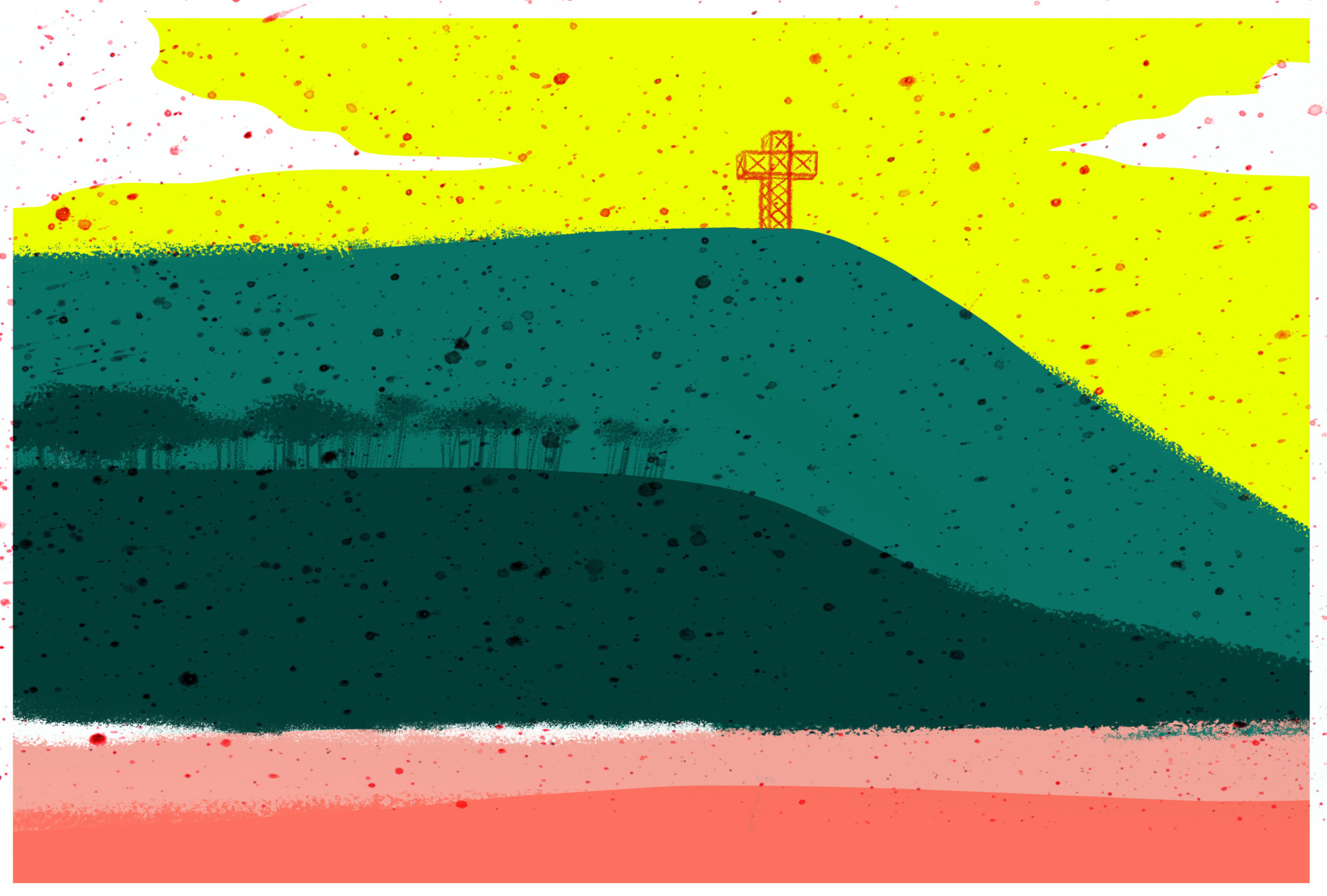
I met Jordan at our favorite Thursday night run club only a few weeks after he finished Black Canyon. With an overpriced beer in one hand and a cup of piss-warm prosecco in the other, he recalled the highlights of his race.
“Man, it was really fun, my training worked well, and I came home with a real sense of accomplishment,” he said smiling.
“But, I digress. I was at another run club last night and a guy I barely know started quizzing me about my race. He said he’d noticed how slow my average pace was on Strava and accused me of walking a lot towards the finish line.” Jordan almost let the snide comment get under his skin, but he quickly remembered that he really just doesn’t give a damn what other people think. After all, running slow is a huge part of Jordan’s persona and he wasn’t going to let anyone put into question his approach to finishing an ultra.
“Ultra running is all about conserving energy and I wasn’t gonna waste any on him,” he rationalized. “His attitude is the opposite of what I’m about.”
He crushed his empty beer can in defiance.
“Man, it was really fun, my training worked well, and I came home with a real sense of accomplishment,” he said smiling.
“But, I digress. I was at another run club last night and a guy I barely know started quizzing me about my race. He said he’d noticed how slow my average pace was on Strava and accused me of walking a lot towards the finish line.” Jordan almost let the snide comment get under his skin, but he quickly remembered that he really just doesn’t give a damn what other people think. After all, running slow is a huge part of Jordan’s persona and he wasn’t going to let anyone put into question his approach to finishing an ultra.
“Ultra running is all about conserving energy and I wasn’t gonna waste any on him,” he rationalized. “His attitude is the opposite of what I’m about.”
He crushed his empty beer can in defiance.
“I run slow because I don’t care what other people think. it’s a form of defiance, my slow protest!”
“In fact, I prefer to do things the opposite of what people think is cool because, well, that’s just me!” he exclaimed with a middle finger salute.
Running slow is Jordan’s thing, it’s something he owns. In a world where faster is almost always better, it stands as a true inspiration to be committed to purposefully running slowly. For Jordan, his “slow protest,” is an act of defiance that stems from a long history of being bullied at school and at home. “My mother used to tell me that I was an embarrassment and that I should be ashamed of who I am (a fat kid with ADHD),” he recalled. He confided how running had helped him rebuild his confidence and how freeing it was to be an ultra-runner because it gave him a platform to be himself while simultaneously proving all of his naysayers wrong.
“Some jerk once told me that I couldn’t run a marathon because I was too damn fat,” he remembered. “I’ve run five now.”
“When I run, I’m able to clear my mind. It’s a form of therapy that gives me the chance to prove to myself that everyone in my past who caused me pain was wrong about me,” Jordan said.
There seems to be a radical happiness and honesty lying in his very simple sense of freedom that stemmed from him accepting himself as someone who runs slowly.
“Splits are for gymnasts,” he joked. “Being DFL (Dead Fucking Last) in a race is really cool. You spend the most time on your feet and you suffer the most. To me, that’s the best part because it means you truly earned it,” he said wisely.
Running slow is Jordan’s thing, it’s something he owns. In a world where faster is almost always better, it stands as a true inspiration to be committed to purposefully running slowly. For Jordan, his “slow protest,” is an act of defiance that stems from a long history of being bullied at school and at home. “My mother used to tell me that I was an embarrassment and that I should be ashamed of who I am (a fat kid with ADHD),” he recalled. He confided how running had helped him rebuild his confidence and how freeing it was to be an ultra-runner because it gave him a platform to be himself while simultaneously proving all of his naysayers wrong.
“Some jerk once told me that I couldn’t run a marathon because I was too damn fat,” he remembered. “I’ve run five now.”
“When I run, I’m able to clear my mind. It’s a form of therapy that gives me the chance to prove to myself that everyone in my past who caused me pain was wrong about me,” Jordan said.
There seems to be a radical happiness and honesty lying in his very simple sense of freedom that stemmed from him accepting himself as someone who runs slowly.
“Splits are for gymnasts,” he joked. “Being DFL (Dead Fucking Last) in a race is really cool. You spend the most time on your feet and you suffer the most. To me, that’s the best part because it means you truly earned it,” he said wisely.
“as I said before, I’m not an athlete, so being mid pack would be the best-case scenario on a good day. I’d prefer to just resort to being badass and suffering the most,” he smiled as he cracked open another beer.
I’ve spent countless hours with Jordan running, climbing, and cursing our way through training blocks just for the chance to suffer a whole lot more come race day. But, as many of us now know, race day isn’t always a guarantee. The Bromont 100 miler in Quebec had been circled in blood and sweat on Jordan’s 2020 race calendar for months prior to it being wiped away by Covid-19. Nonetheless, he pushed forward, bullheaded and undeterred, and set out in October to run his first one hundred miles around Mont Royal in ten, 10-mile loops.
It became a rare opportunity for those uninitiated into the world of ultra running to see first hand what it looks like for someone to push themselves well beyond their breaking point. For thirty-two hours and thirty-six minutes, he ran, hobbled, and hallucinated alongside members of the Montreal running community, some of whom pushed themselves to achieve their own personal best, inspired by Jordan’s grit and determination to finish his first 100 miler. Even though Jordan still refuses to think of himself as an athlete, not a single person who ran with him during those two days would ever assume that he’s anything but that.
It became a rare opportunity for those uninitiated into the world of ultra running to see first hand what it looks like for someone to push themselves well beyond their breaking point. For thirty-two hours and thirty-six minutes, he ran, hobbled, and hallucinated alongside members of the Montreal running community, some of whom pushed themselves to achieve their own personal best, inspired by Jordan’s grit and determination to finish his first 100 miler. Even though Jordan still refuses to think of himself as an athlete, not a single person who ran with him during those two days would ever assume that he’s anything but that.
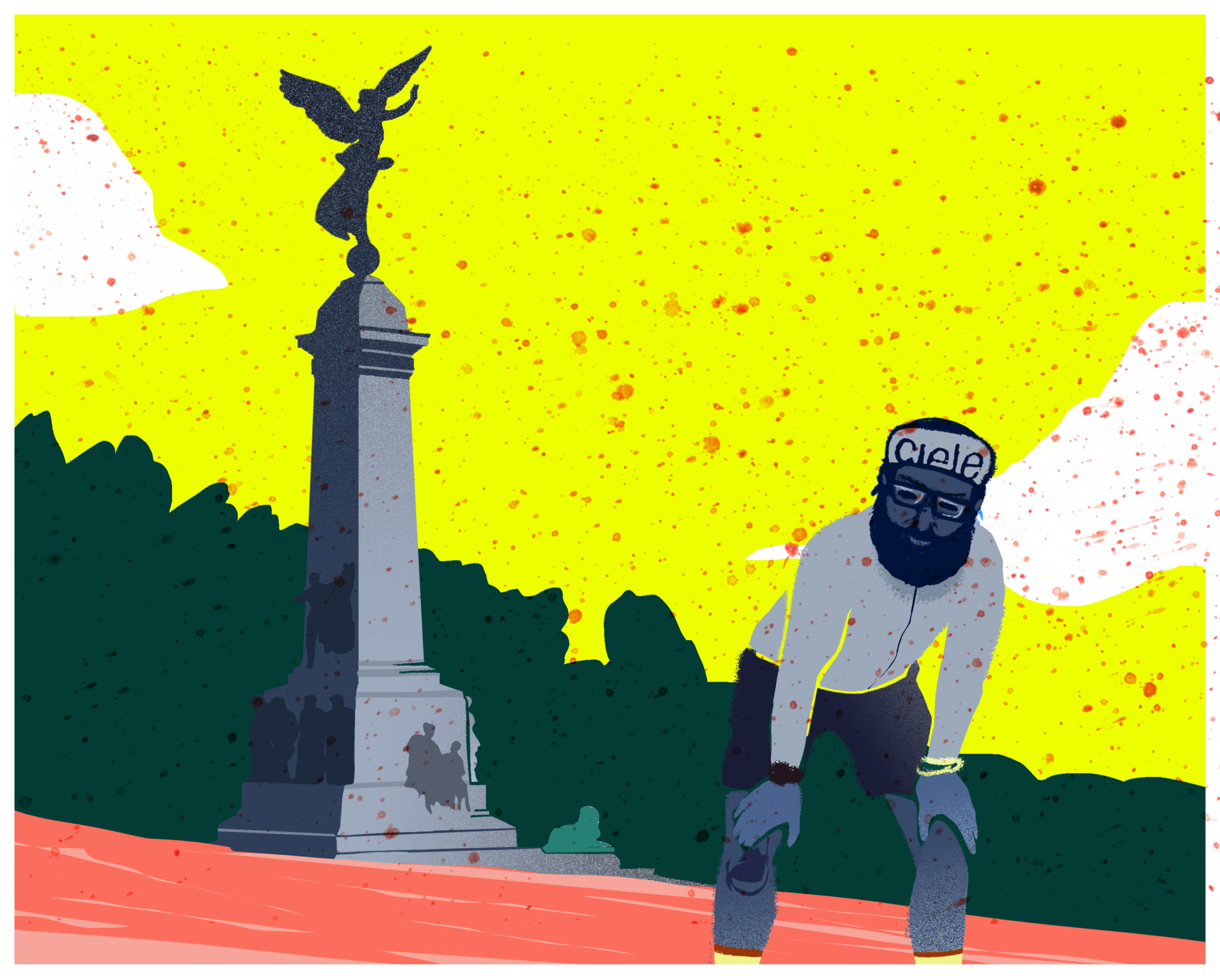
jordan happily shares, “I love ultra running because it has a real sense of community and acceptance. everyone encourages everyone else and races just end up being a celebration of all of your hard work and dedication.”
On a personal level, the transformative experiences we have as runners eventually affect the way we relate to the world and to others. For Jordan, his experiences encompassed a radical shift towards accepting himself as a non-conformist running punk who couldn’t care less about what others think of his pace, his stride, or even what he looks like. He has employed these lessons to drastically increase his capacity to love who he’s become.
Running isn’t always about splits and strides and fastest known times. Podiums are often lonely places, alienating and separate from the one thing that makes running the sport that it is: the surrounding community. Thankfully, there are those within our circles like Jordan who not only celebrate being slow, but take it one step further and use it as a tool to transform themselves and the people fortunate enough to run alongside them. Jordan and other runners like him remind us through their slow protest that even though they might not look or even behave like an athlete, they most certainly are, and that each individual deserves the chance to run freely and to learn to love themselves at their own damn pace.
Running isn’t always about splits and strides and fastest known times. Podiums are often lonely places, alienating and separate from the one thing that makes running the sport that it is: the surrounding community. Thankfully, there are those within our circles like Jordan who not only celebrate being slow, but take it one step further and use it as a tool to transform themselves and the people fortunate enough to run alongside them. Jordan and other runners like him remind us through their slow protest that even though they might not look or even behave like an athlete, they most certainly are, and that each individual deserves the chance to run freely and to learn to love themselves at their own damn pace.
more articles




